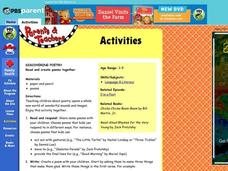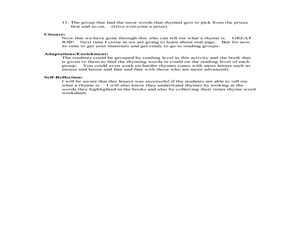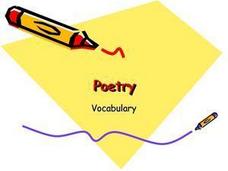Curated OER
Write Your Own Poem: Rhyming Word Pattern -end, -ind, -and
In this rhyming verse worksheet, students read 20 words in a chart and color them according to the directions, using a different color for each ending rhyme pattern. Students then answer 10 questions in which they write simple nonsense...
Curated OER
Write Your Own Poem
In this wring a poem worksheet, students find words that rhyme with ones given and use these rhyming pairs of words to create sentences and two line poems that rhyme. Students write twenty answers.
Read Write Think
Poetry Portfolios: Using Poetry to Teach Reading
Over the course of five periods, scholars create a poetry portfolio. They begin with a reading of the poem, Firefly. With a focus on vocabulary, learners reread the poem then look for sight words and other skills.
Poetry4kids
Rhythm in Poetry: The Basics
What makes a great poem sound so good? Learn the rhythmic secrets of poetry with an explanatory online lesson.
Poetry4kids
How to Write an Alliteration Poem
Learners follow five steps to compose an alliteration poem. They choose one consonant and brainstorm as many nouns, verbs, and adjectives they can think of to create rhyming sentences that come together in a poetic fashion.
Education Oasis
Creative Writing Unit: Analyzing, Interpreting, Discussing and Writing Various Genres of African-American Literature
A six-week unit takes high schoolers through various works of African-American literature, including poems, plays, and short stories. The lesson plan format includes a week-by-week description of activities, goals, materials, and...
Curated OER
Nurture Poetry
Students create a poetry book. In this poetry lesson plan, students write a cinquain poem, name poem, haiku, limerick, and preposition poem.
Curated OER
Discovering Poetry
Poetry is such a wonderful form of writing. Young children naturally gravitate to it because of the the wonderful imagery and the rhyming of the words. After sharing some poems with your kids, they work together to create a class poem....
Curated OER
Writing Limericks
Eighth graders compose or create works of communication for specific audiences and purposes. They locate, access, and select relevant information from a variety of sources. They revise and edit their work to improve content, organization...
Curated OER
Poems: Identifying Patterns
Here is a great learning exercise that contains two short poems to compare and contrast. Children will read each poem out loud and then complete three comparative analysis questions which focus on rhyme, structure, and language. Note:...
Curated OER
The Wonderful Pigs of Jillian Jiggs: Rhyming Words
Readers explore rhyming words. They will use the story The Wonderful Pigs of Jillian Jiggs to identify rhyming words. Then they will create their own lists of rhyming words. In the end, they will be able to come up with words that rhyme...
Curated OER
A Poem to Share
This festive winter poem incorporates rhyming using the oa sound. Readers examine the words to find examples that use that sound. This is good phonics exposure to words that have the same sound but are spelled differently. Challenge them...
Curated OER
Poetry Vocabulary
Consisting of a thorough and straightforward list of poetry terminology, the first part of this presentation would be a good introduction to a poetry unit, or a review for an upcoming poetry project. The list of terms is quite extensive,...
Poetry4kids
Rhythm in Poetry: Okie Dokie, Here’s the Trochee
Iambs and trochees may seem intimidating to some learners, but after reading a straightforward online lesson, they'll be masters of poetic feet! The lesson includes examples of trochaic poems from Edgar Allen Poe and William Blake.
Curated OER
Write Your Own Poem 'Ug'
In this rhyming words activity, students color the words that rhyme with bug, put the words that rhyme with bug into pairs, make a silly sentence with the 'ug' words, and write a poem using the 'ug' words from the word bank.
K12 Reader
Poetry Uses Rhyme
It's rhyme time! After reading a short article about poems that rhyme, kids take the time answer questions about the message of the passage.
Curated OER
Poetry Workshop: Putting Feelings into Words
Poetry is a wonderful way for learners to express themselves and develop writing skills. A comprehensive PowerPoint presentation defines, and provides examples of, the types and components of poetry. The presentation concludes with a...
Curated OER
Word Beads: Writing Poetry
Second graders write rhyming poems. In this poetry writing lesson, 2nd graders discuss the meaning of the word "funny." They use word tiles to create a rhyming poem which they transpose into their writing journals. They listen to...
Curated OER
A Garden of Verses: Poems About Class Gardens
Young scholars explore botany by participating in a language arts activity. For this garden poetry lesson, students read the classic poem "Mary, Mary Quite Contrary" and discuss the imagery and rhyming methods used. Young scholars...
Curated OER
I Spy Poetry
Explore the components of rhythm and form through a reading of Jean Marzollo's I Spy books. After discussing Marzollo’s format, the class agrees upon a theme for a class book and topics that fit with that theme. Pupils write a poem,...
Poetry4kids
Rhythm in Poetry: More Than Two Feet
Want to put some feet in your head? Check out an online lesson about spondees, dactyls, and anapests to bring new structure to your poetic forms.
Curated OER
Poems: Humourous Verses
First grade is a great time to build strong reading skills. Here are three short rhyming poems or common nursery rhymes that are intended to help boost reading fluency. Because most children know these rhymes, they will have an easier...
Curated OER
Discussing Poetry In Class
Students investigate syllabic metre and rhyming techniques by analyzing poetry. In this language arts lesson, students read the poem Considering the Snail and discuss the nature and mood of the poem with their classmates. Students...
Curated OER
Words and Pictures - Write Your Own Poem
In this writing worksheet, students write lists of words that rhyme with the words throne, shrug, throat, and shred. They write sentences using the rhyming words and attempt to write a rhyming poem.

























